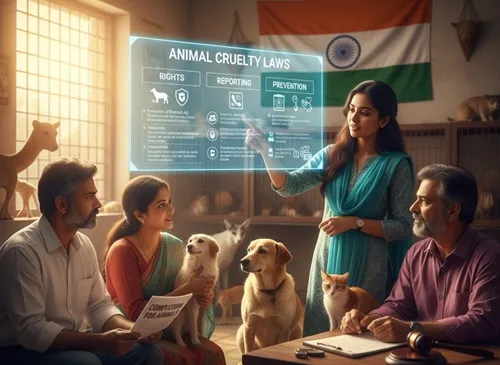
Overview
The Prevention of Cruelty to Animals Act, 1960 protects all animals—pets, strays, farm, and working animals—from unnecessary pain or suffering. It regulates how animals are treated, transported, and used in entertainment or experiments.
It also established the Animal Welfare Board of India (AWBI) to promote humane treatment and monitor cruelty cases.
Main Provisions
| Key Protection | What It Means |
|---|---|
| Cruelty Ban | Beating, torturing, starving, overloading, or confining animals in cruel conditions is illegal. |
| Abandonment | Leaving a pet or injured animal without care is punishable. |
| Animal Experiments | Permitted only under ethical and scientific guidelines. |
| Transportation Rules | Animals must be transported with space, food, and ventilation as per government norms. |
| Circus/Entertainment Use | Allowed only with welfare rules; wild animals like lions and tigers are banned. |
| Street Animals | Protected by law; harming or relocating them illegally is an offense. |
Documents & Rules
- The Prevention of Cruelty to Animals (Transport of Animals) Rules, 1978 & 2001
- The Prevention of Cruelty to Animals (Slaughterhouse) Rules, 2001
- Performing Animals (Registration) Rules, 2001
- Animal Birth Control (Dogs) Rules, 2001 & 2023
- Prevention of Cruelty to Animals (Care and Maintenance of Case Property Animals) Rules, 2017
All official notifications and amendments are available on: https://dahd.gov.in/hi
Punishment
- For first-time offenders: Fine ₹10–₹50
- For repeat offenders: Fine up to ₹100 or imprisonment up to 3 months
(Note: Amendments to increase penalties are under consideration.)
How to Report Animal Cruelty
| Action | Contact |
|---|---|
| Police Help | Call 112 or visit nearest police station (FIR under PCA Act, 1960) |
| Animal Welfare Board of India (AWBI) | Website: www.awbi.gov.in |
| Local SPCA / Municipal Body | File a complaint at local civic or veterinary department |
| NGOs | PETA India, Friendicoes, Blue Cross, People for Animals – assist in rescue and reporting |
If You Want to Help
| How You Can Participate | Where to Start |
|---|---|
| Volunteer for Animal Shelters | Contact AWBI-registered NGOs on www.awbi.gov.in |
| Adopt, Don't Shop | Adopt from shelters instead of buying pets. |
| Feed Stray Animals | Allowed under law; maintain hygiene and avoid public obstruction. |
| Educate & Report | Spread awareness and immediately report cruelty cases. |
State-wise Animal Welfare Board Contacts
| State / UT | Welfare Board / Contact |
|---|---|
| Maharashtra | Maharashtra Animal Welfare Board – ahd.maharashtra.gov.in |
| Delhi | Delhi SPCA – animalhusbandry.delhi.gov.in |
| Uttrakhand | Animal Welfare Board (State) – ahd.uk.gov.in |
| Karnataka | Karnataka Animal Welfare Board – ahvs.karnataka.gov.in |
| Gujarat | State Animal Welfare Board – doah.gujarat.gov.in |
| Kerala | Animal Husbandry Department – ahd.kerala.gov.in |
Frequently Asked Questions (FAQs)
-
Q1. Which animals are protected under this Act?
-
All animals—domestic, wild, strays, birds, and farm animals.
-
Q2. Is beating or kicking an animal punishable?
-
Yes. It's considered cruelty under Section 11.
-
Q3. Can I feed stray dogs or cats?
-
Yes. Courts have upheld the right to feed animals, but it should not create a public nuisance.
-
Q4. Can animals be used in films or circuses?
-
Only with AWBI registration and humane conditions. Wild animals like lions and bears are banned.
-
Q5. What happens if I abandon my pet?
-
It's a punishable offense under Section 11(1)(i).
-
Q6. Can I be arrested for harming an animal?
-
Yes. Police can register an FIR and detain you under the PCA Act.
-
Q7. Are there state-wise animal welfare boards?
-
Yes, each state has one under the guidance of the AWBI.
-
Q8. Is religious animal slaughter banned?
-
Not banned, but regulated. It must be humane and within legal limits.
-
Q9. Can I join government animal welfare efforts?
-
Yes. Apply for AWBI volunteer or NGO registration on www.awbi.gov.in.
-
Q10. What is being done to make punishments stronger?
-
The government has proposed amendments to increase fines and jail terms significantly.
Add new comment